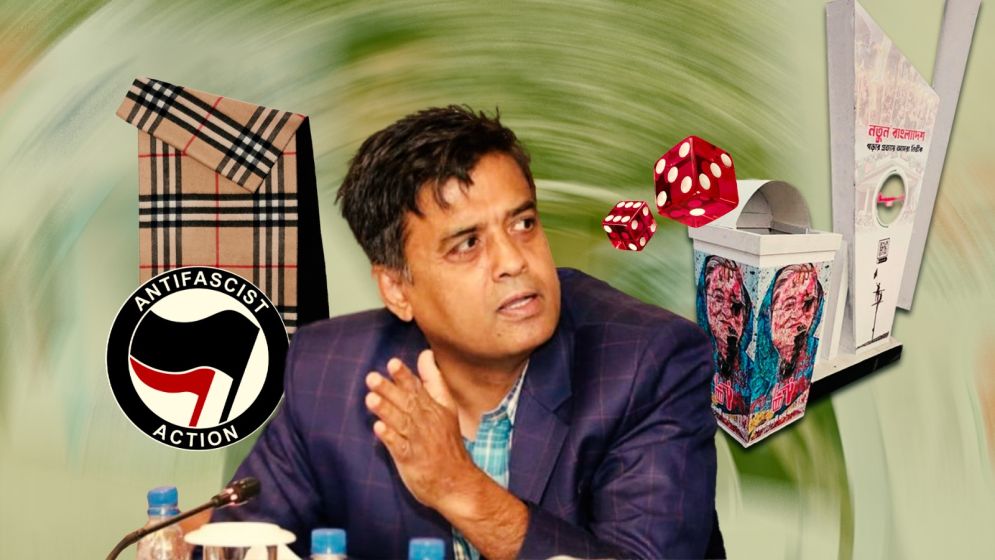Shafiqul Alam is playing a high-stake game…and it's paying off

The role of the Press Secretary to the head of government in Bangladesh has long been regarded as one of the most coveted positions within the country’s journalistic elite.
Typically, it is awarded to a senior journalist—someone whose political leanings, if not outright affiliation, align with the ruling party.
Beyond the prestige, the Press Secretary wields significant influence, serving as the mouthpiece for the country’s highest office and, by extension, shaping public perception of the executive branch.
In previous administrations, particularly under the rule of the ousted dictator Sheikh Hasina, we saw how even deputy press secretaries effectively called the shots on a range of matters, from policy to multimillion-dollar business deals, further solidifying their clout within the political ecosystem.
Enter Shafiqul Alam, a former bureau chief for Agence France-Presse (AFP) in Dhaka, who was appointed Press Secretary to the Chief Advisor of the Interim Government led by Dr. Muhammad Yunus.
His appointment came on the heels of a three-day period in which Bangladesh was effectively without a functioning government.
On paper, Shafiqul’s role was supposed to follow the traditional script: he would be the official spokesperson for the Chief Advisor, carefully staying within the boundaries of his bureaucratic mandate and avoiding any politically charged actions.
But in just six months, the 55-year-old Shafiqul has dramatically reshaped the role, venturing into territory more suited for a political operative than a government spokesperson.
His actions—filled with political undertones—have made him the most talked-about Press Secretary in Bangladesh’s history.
What’s perhaps even more striking is that these actions, often viewed as politically charged, have undoubtedly brought significant rewards—particularly in strengthening the very cause that sparked the 21-day uprising, a revolutionary movement that ultimately dismantled the kleptocratic, mafia-like regime under Hasina.

Propagating political narratives
The interim government has long since passed its honeymoon phase, and now nearly every action it takes is scrutinized through a lens of skepticism, criticism, and frustration.
This is understandable, as the core demands of the people—justice for the victims of the July violence, accountability for the Awami cronies, lower prices for essential goods, and a true restoration of law and order—have yet to be fully realized, at least in the eyes of the public.
However, if we move beyond the cloud of perception shaped by popular sentiment and social media-fueled misinformation, and look at the situation through a more pragmatic lens, it becomes clear that the interim government has made notable strides on all these fronts.
After six months in power, the government has not only introduced reform proposals but also made significant headway in implementing the mechanisms necessary to ensure justice.
The increased activity of the Anti-Corruption Commission (ACC) and the Bangladesh Financial Intelligence Unit (BFIU) speak to the government’s efforts in tackling corruption.
Additionally, the prices of several essential goods, including many vegetables, have seen a marked decline.
Restoring genuine law and order remains a Herculean task, given that the entire police force was turned into an arm of the Awami League’s mafia-like network. Nonetheless, significant purges have taken place within the police force, signaling a shift toward reform.
Shafiqul Alam, in his role as Press Secretary, has frequently used regular press briefings and appearances on talk shows to highlight these developments.
While this is part of his job, it’s not what has made Shafiqul a household name.
With his unassuming, even monotone delivery, Shafiqul has done what any government in a transitional period—especially one that has come to power after toppling a fascist, mafia-style regime—should do: dismantling the narratives of the former Awami League government and ensuring that the party loses its grip on both political and social capital.
And this strategy is paying off. In post-uprising Bangladesh, the one unifying factor among a fractured populace is the widespread and deep-seated animosity toward the Awami League and Sheikh Hasina.
In this context, Shafiqul has emerged as a key figure—almost a messiah—propagating this narrative with remarkable skill and impact.

In the eye of the storm
Take, for example, Shafiqul’s latest stunt—throwing trash into a bin adorned with Hasina’s graffiti on the opening day of the book fair. It instantly became the talk of the town over the weekend.
While some criticized the act, arguing that a senior bureaucrat should refrain from engaging in such politically charged gestures, the broader public and online community were overwhelmingly supportive.
Many saw it as a symbolic moment, declaring that the time had come to “throw Hasina into the dustbin of history.”
Shafiqul has also leveraged his popular "DhakaDiary" posts on Facebook to consistently remind the public why the Awami League should never be allowed to regain political power—warning that doing so could bring back the very fascist elements that Bangladesh had recently ousted.
In the process, Shafiqul has become one of the top five most talked-about figures within the interim government.
Unsurprisingly, he has placed himself at the center of the storm—the relentless disinformation campaigns orchestrated by Awami League cronies, fueled by their ill-gotten wealth.
Just a few days ago, a viral Facebook post falsely claimed that Shafiqul had been seen wearing an 86,000 taka Burberry scarf.
Rather than letting it slide, Shafiqul, with his sharp sense of humor, turned the narrative on its head—mocking the absurd claim and exposing the baseless smear campaign for what it was, much to the embarrassment of his detractors.
In a rare move for a public figure, Shafiqul also made a full disclosure of his personal wealth on his verified Facebook page. Predictably, his critics tried to twist this into an allegation of corruption, despite the fact that his financial statement was transparent and free of any signs of illicit gain.
There's no denying that Shafiqul, in his role as Press Secretary, is playing a high-stakes game. And one can assume there are deeper motivations behind his actions.
In the post-uprising political landscape of Bangladesh, where both major political parties tread carefully, and the student-led movement that sparked the uprising is poised to form its own party, everyone’s actions are politically charged.
Shafiqul, at the forefront of this dynamic, is no exception.
It’s clear that he’s positioning himself for something more after his current assignment ends—likely an entry into politics. His growing influence, particularly in his hometown constituency, where he maintains strong grassroots connections, suggests that he may have a real shot at success if he chooses to make that leap.
For now, though, he’s playing a high-stakes game—and so far, it seems to be paying off.
—-
Harun Ur Rashid is a writer and commentator

